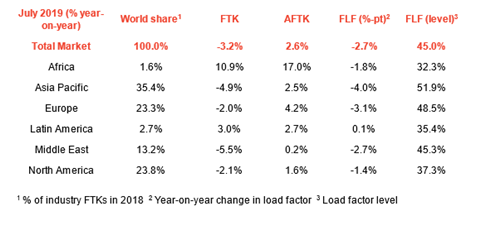
The airfreight market reported its ninth consecutive year-on-year decline in a row in July, according to the latest monthly figures from IATA.
The airline association said that freight tonne kms (FTKs) declined by 3.2% year on year in July as the China-US trade war continued to take its toll on the market.
Over the first seven months of the year IATA figures show the market has declined by 3.5%.
The performance in July is an improvement on the 4.8% decline recorded in June, although WorldACD pointed out that figures for June may have been affected by the timings of holidays and weekends.
Meanwhile, freight capacity in July increased by 2.6% compared with a year ago, resulting in the cargo load factor for the month dropping by 2.7 percentage points to 45%.
Air cargo continues to suffer from weak global trade and the intensifying trade dispute between the US and China, IATA said.
Global trade volumes are 1.4% lower than a year ago and trade volumes between the US and China have fallen by 14% year-to-date compared to the same period in 2018.
IATA added that the global Purchasing Managers Index (PMI) does not indicate an uptick and said that its tracking of new manufacturing export orders has pointed to falling orders since September 2018.
"And for the first time since February 2009 all major trading nations reported falling orders," IATA warned.
IATA director general and chief executive Alexandre de Juniac said: "Trade tensions are weighing heavily on the entire air cargo industry.
"Higher tariffs are disrupting not only transpacific supply chains but also worldwide trade lanes.
"While current tensions might yield short-term political gains, they could lead to long-term negative changes for consumers and the global economy.
"Trade generates prosperity. It is critical that the US and China work quickly to resolve their differences."
Looking at regional performance, IATA said that airlines in Asia-Pacific and the Middle East suffered sharp declines in year-on-year growth in July 2019, while North America and Europe experienced more moderate declines.
Africa and Latin America both recorded growth in airfreight demand compared to July last year.
IATA said that Asia Pacific airlines saw demand for airfreight contract by 4.9% in July compared with a year earlier.
"The US-China trade war and weaker manufacturing conditions for exporters in the region have significantly impacted the market," the association warned.
"With the region accounting for more than 35% of total FTKs, this performance is the major contributor to the weak industry-wide outcome."
North American airlines saw demand decrease by 2.1% year on year in July.
"Despite a sound economic backdrop supporting consumer spending, the US-China trade tensions continue to weigh on the region’s carriers," IATA said.
"Freight demand between Asia and North America have fallen by almost 5% in year-on-year terms."
In Europe, airlines posted a 2% decrease in freight demand during the month as weaker manufacturing conditions for exporters in Germany, heightened recession fears, and ongoing uncertainty over Brexit affected performance.
Middle Eastern airlines’ freight volumes decreased 5.5% in July on last year.
"Escalating trade tensions, the slowing in global trade and airline restructuring have impacted the recent performance," IATA said.
Meanwhile, Latin American airlines reported an increase in freight demand for the month 3% compared with last year as the Brazilian economy recovered to avoid a recession.
"However, concerns regarding the outlook for some key Latin American countries including Argentina remain," IATA warned.
African carriers posted growth of 10.9% year on year. Strong trade and investment linkages with Asia have underpinned a double-digit increase in air freight volumes between the two regions over the past year.















